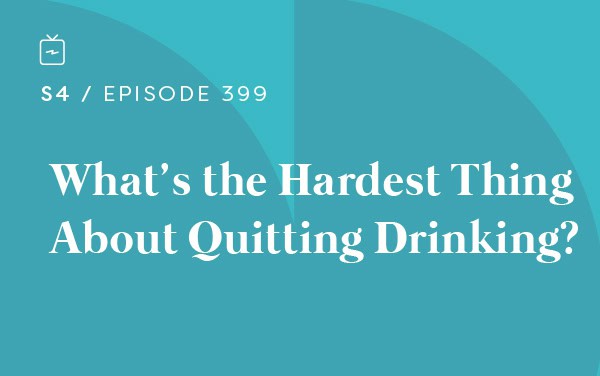Podcast: Play in new window | Download
Subscribe to the Recovery Elevator Podcast Apple Podcasts | RSS | More
Episode 399 – What’s the hardest part about quitting drinking?
Today we have Zita. She is 31, from Minnesota, and took her last drink on November 27, 2021.
Restore: https://www.recoveryelevator.com/restore/
Highlights from Paul
An AF life is overall better than drinking. The key word is overall. Quitting drinking is the hardest thing Paul has ever done, and, it’s the best decision he’s ever made.
Not quitting is harder on you than you realize. The domino effect of addiction cascades to your health, your relationships, your livelihood, and your sense of well-being. Those rock bottoms get worse and hit new depths that create despair, shame and helplessness. The decision to quit drinking can be harder when you don’t have those rock bottom moments, but you still have that voice in your head telling you, it’s time. Quitting isn’t easy, particularly in the beginning, but it has its own set of dominos, the path toward a better life.
The hardest part about quitting drinking isn’t the withdrawals or burning the ships. It’s entering the path of the unknown: infinite possibilities exist.
You can put the shovel down at any time.
Better Help: www.betterhelp.com/elevator – 10% off your first month. #sponsored
[12:26] Zita is an ICU nurse. She loves cooking, travel, rollerblading, movies, and getting her nails done. She is headed back to school to become a nurse practitioner.
Zita’s relationship with alcohol started in her early teens. She was a normal drinker through college. She drank a lot, but it never impacted her school, her relationships, or her ability to function. After college, she started working and a few years in she noticed having anxiety when she was around people which was a shift. After a breakup, she started using alcohol to cope with her emotions.
Zita’s family members spoke with her about her drinking, intervention style. She thought about slowing down but quitting never occurred to her at that point. Upon continued reflection, Zita realized she had some unprocessed trauma. She tried naltrexone, Antabuse and Women for Sobriety. Nothing was working. She shifted her approach to working on mental health and took a month off work and started DBT (dialectical behavioral therapy) treatment. Mental health support gave her new tools to shift her mindset. The first few months were hard and she nearly relapsed, but she gained some momentum.
Today, Zita feels great. She has gained assertiveness, confidence and learned to develop boundaries. She doesn’t have her “old self” back, she has a better life. Zita is proud that she has learned to manage her emotions more effectively. Looking forward, Zita is excited about graduating. She focused her education on mental health, and she looks forward to making broader contributions with her new knowledge.
Paul’s Summary
Paul believes you are about to bloom. Nobody exists without a purpose in the universe. Things under pressure produce new results; rocks under pressure become diamonds. The blooming has already begun.
[47:21] Musical submission from The Aquerials.
Upcoming events, retreats, and courses:
- You can find more information about our events
Resources
Connect with Cafe RE – Use the promo code OPPORTUNITY to waive the set-up fee.
Recovery Elevator YouTube – Subscribe here!
Recovery Elevator-
We are the only ones who can do this, but you don’t have to do it alone.
I love you guys.




What was the monthlong DBT training Zita mentions?
Hi Tibi! DBT is dialectical behavioral therapy, it is a type of cognitive behavioral therapy.